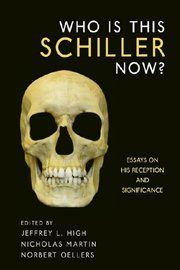Book contents
- Frontmatter
- Contents
- Foreword
- Acknowledgments
- List of Abbreviations
- Introduction: Why Is This Schiller [Still] in the United States?
- Part I Schiller, Drama, and Poetry
- Part II Schiller, Aesthetics, and Philosophy
- 6 Die Moralphilosophie des jungen Schiller. Ein, Kantianer ante litteram'
- 7 Aesthetic Humanism and Its Foes: The Perspective from Halle
- 8 Zur kulturpolitischen Dynamik des ästhetischen Spiels in Schillers Briefen Ueber die ästhetische Erziehung des Menschen
- 9 Die Empfänglichkeit für den ästhetischen Schein ist das a priori des Schönen in Kants Kritik der Urteilskraft. Das Orientierende in Schillers Forderung der ästhetischen Erziehung des Menschen
- 10 Energy and Schiller's Aesthetics from the “Philosophical” to the Aesthetic Letters
- 11 “Making Other People's Feelings Our Own”: From the Aesthetic to the Political in Schiller's Aesthetic Letters
- Part III Schiller, History, and Politics
- Part IV Schiller Reception — Reception and Schiller
- Part V Schiller Now
- Notes on the Contributors
- Index
7 - Aesthetic Humanism and Its Foes: The Perspective from Halle
from Part II - Schiller, Aesthetics, and Philosophy
Published online by Cambridge University Press: 05 February 2013
- Frontmatter
- Contents
- Foreword
- Acknowledgments
- List of Abbreviations
- Introduction: Why Is This Schiller [Still] in the United States?
- Part I Schiller, Drama, and Poetry
- Part II Schiller, Aesthetics, and Philosophy
- 6 Die Moralphilosophie des jungen Schiller. Ein, Kantianer ante litteram'
- 7 Aesthetic Humanism and Its Foes: The Perspective from Halle
- 8 Zur kulturpolitischen Dynamik des ästhetischen Spiels in Schillers Briefen Ueber die ästhetische Erziehung des Menschen
- 9 Die Empfänglichkeit für den ästhetischen Schein ist das a priori des Schönen in Kants Kritik der Urteilskraft. Das Orientierende in Schillers Forderung der ästhetischen Erziehung des Menschen
- 10 Energy and Schiller's Aesthetics from the “Philosophical” to the Aesthetic Letters
- 11 “Making Other People's Feelings Our Own”: From the Aesthetic to the Political in Schiller's Aesthetic Letters
- Part III Schiller, History, and Politics
- Part IV Schiller Reception — Reception and Schiller
- Part V Schiller Now
- Notes on the Contributors
- Index
Summary
This paper contextualizes Schiller's contribution to aesthetics, in particular the conceptual link between aesthetic experience and the idea of humanity, by describing the beginnings of aesthetics at the University of Halle. Baumgarten and Meier present aesthetic experience as an antidote to the abstraction of the established disciplines, the study of which turns the student into a “Schul fuchs” (pedant). Schiller presents the argument in a different frame, attacking science and Christianity in “Die Götter Griechenlandes” (The Gods of Ancient Greece, 1788), for example, but there is continuity in the view that aesthetic experience is a cure for anthropological impoverishment. But the paper also stresses the new role of contemplation. By insisting on the dematerializing role of aesthetic experience in such concepts as “Schein” (appearance), Schiller undermines his own “rehabilitation of sensuality” and offers a paradoxical theory by which aesthetic experience consists of equal proportions of self-indulgence and self-mastery.
WHAT ACTUALLY IS AESTHETICS, what is its significance, and why did it crop up when it did? These are questions worth asking before we try to assess Schiller's contribution to this discipline, although in working through his aesthetic writings, readers are generally so taxed by the task of following the twists of the argument that they can be forgiven if they lose sight of this larger context. We are often told that the great accomplishment of Kant and Schiller and their precursors in the German Enlightenment is to have delineated aesthetic experience, that is, our capacity for disinterested enjoyment of sensory forms, as a distinct mental faculty requiring a distinct branch of philosophy.
- Type
- Chapter
- Information
- Who Is This Schiller Now?Essays on his Reception and Significance, pp. 116 - 132Publisher: Boydell & BrewerPrint publication year: 2011

